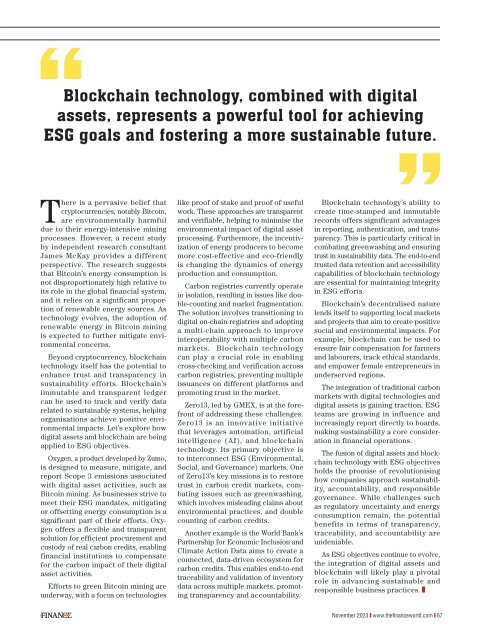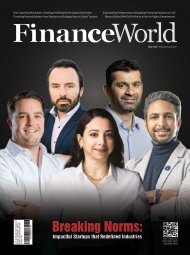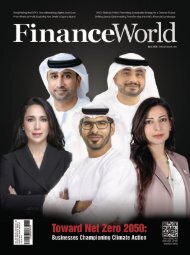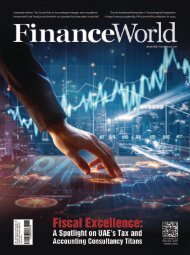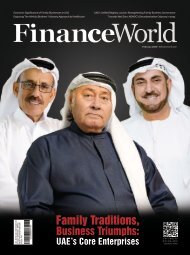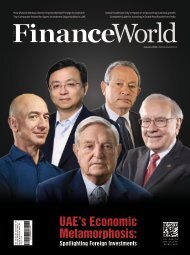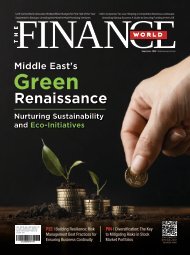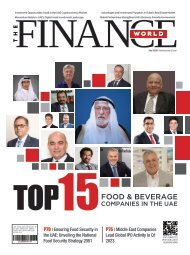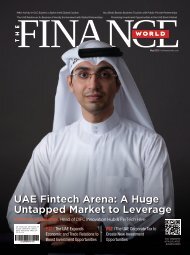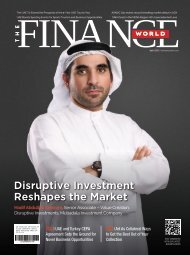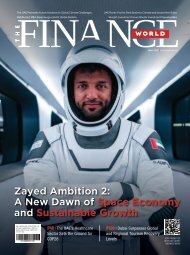The Finance World Magazine| Edition: November 2023
As COP28 unfolds, finance takes the spotlight, intricately linked to Climate Transition and Adaptation. This edition of The Finance World Magazine explores the finance-sustainability connection and the growing trend in the MENA region. In this edition, the focus lies on influential leaders from the UAE who are leaving a significant mark on sustainability. Employing a rigorous selection process, the cover story of this magazine highlights 10 UAE leaders who have substantially participated in sustainability efforts. Notable figures include Sultan Al Jaber, the president-designate of COP28, and Emirati Visionaries Razan Al Mubarak and Shamma Al Mazrui, who are appointed as ambassadors for COP28. Centred around sustainability and finance, this edition highlights different aspects of green initiatives surging in the Middle East, including the ESG revolutions in the fintech sector, green investments in luxury real estate across UAE, and the rise of sustainable tourism throughout the region. It also encompasses informative articles on "Leveraging Digital Assets and Blockchain for Achieving ESG Objectives," "Balancing Profit and Protection: Investing in Wildlife Sanctuaries," and much more. Keep yourself up to date with all financial sector news with our current news segments. Each person can find something unique from us. We believe our readers deserve real value from what we have to offer.
As COP28 unfolds, finance takes the spotlight, intricately linked to Climate Transition and Adaptation. This edition of The Finance World Magazine explores the finance-sustainability connection and the growing trend in the MENA region.
In this edition, the focus lies on influential leaders from the UAE who are leaving a significant mark on sustainability. Employing a rigorous selection process, the cover story of this magazine highlights 10 UAE leaders who have substantially participated in sustainability efforts. Notable figures include Sultan Al Jaber, the president-designate of COP28, and Emirati Visionaries Razan Al Mubarak and Shamma Al Mazrui, who are appointed as ambassadors for COP28.
Centred around sustainability and finance, this edition highlights different aspects of green initiatives surging in the Middle East, including the ESG revolutions in the fintech sector, green investments in luxury real estate across UAE, and the rise of sustainable tourism throughout the region. It also encompasses informative articles on "Leveraging Digital Assets and Blockchain for Achieving ESG Objectives," "Balancing Profit and Protection: Investing in Wildlife Sanctuaries," and much more.
Keep yourself up to date with all financial sector news with our current news segments. Each person can find something unique from us. We believe our readers deserve real value from what we have to offer.
You also want an ePaper? Increase the reach of your titles
YUMPU automatically turns print PDFs into web optimized ePapers that Google loves.
Blockchain technology, combined with digital<br />
assets, represents a powerful tool for achieving<br />
ESG goals and fostering a more sustainable future.<br />
<strong>The</strong>re is a pervasive belief that<br />
cryptocurrencies, notably Bitcoin,<br />
are environmentally harmful<br />
due to their energy-intensive mining<br />
processes. However, a recent study<br />
by independent research consultant<br />
James McKay provides a different<br />
perspective. <strong>The</strong> research suggests<br />
that Bitcoin’s energy consumption is<br />
not disproportionately high relative to<br />
its role in the global financial system,<br />
and it relies on a significant proportion<br />
of renewable energy sources. As<br />
technology evolves, the adoption of<br />
renewable energy in Bitcoin mining<br />
is expected to further mitigate environmental<br />
concerns.<br />
Beyond cryptocurrency, blockchain<br />
technology itself has the potential to<br />
enhance trust and transparency in<br />
sustainability efforts. Blockchain’s<br />
immutable and transparent ledger<br />
can be used to track and verify data<br />
related to sustainable systems, helping<br />
organisations achieve positive environmental<br />
impacts. Let’s explore how<br />
digital assets and blockchain are being<br />
applied to ESG objectives.<br />
Oxygen, a product developed by Zumo,<br />
is designed to measure, mitigate, and<br />
report Scope 3 emissions associated<br />
with digital asset activities, such as<br />
Bitcoin mining. As businesses strive to<br />
meet their ESG mandates, mitigating<br />
or offsetting energy consumption is a<br />
significant part of their efforts. Oxygen<br />
offers a flexible and transparent<br />
solution for efficient procurement and<br />
custody of real carbon credits, enabling<br />
financial institutions to compensate<br />
for the carbon impact of their digital<br />
asset activities.<br />
Efforts to green Bitcoin mining are<br />
underway, with a focus on technologies<br />
like proof of stake and proof of useful<br />
work. <strong>The</strong>se approaches are transparent<br />
and verifiable, helping to minimise the<br />
environmental impact of digital asset<br />
processing. Furthermore, the incentivization<br />
of energy producers to become<br />
more cost-effective and eco-friendly<br />
is changing the dynamics of energy<br />
production and consumption.<br />
Carbon registries currently operate<br />
in isolation, resulting in issues like double-counting<br />
and market fragmentation.<br />
<strong>The</strong> solution involves transitioning to<br />
digital on-chain registries and adopting<br />
a multi-chain approach to improve<br />
interoperability with multiple carbon<br />
markets. Blockchain technology<br />
can play a crucial role in enabling<br />
cross-checking and verification across<br />
carbon registries, preventing multiple<br />
issuances on different platforms and<br />
promoting trust in the market.<br />
Zero13, led by GMEX, is at the forefront<br />
of addressing these challenges.<br />
Zero13 is an innovative initiative<br />
that leverages automation, artificial<br />
intelligence (AI), and blockchain<br />
technology. Its primary objective is<br />
to interconnect ESG (Environmental,<br />
Social, and Governance) markets. One<br />
of Zero13’s key missions is to restore<br />
trust in carbon credit markets, combating<br />
issues such as greenwashing,<br />
which involves misleading claims about<br />
environmental practices, and double<br />
counting of carbon credits.<br />
Another example is the <strong>World</strong> Bank’s<br />
Partnership for Economic Inclusion and<br />
Climate Action Data aims to create a<br />
connected, data-driven ecosystem for<br />
carbon credits. This enables end-to-end<br />
traceability and validation of inventory<br />
data across multiple markets, promoting<br />
transparency and accountability.<br />
Blockchain technology’s ability to<br />
create time-stamped and immutable<br />
records offers significant advantages<br />
in reporting, authentication, and transparency.<br />
This is particularly critical in<br />
combating greenwashing and ensuring<br />
trust in sustainability data. <strong>The</strong> end-to-end<br />
trusted data retention and accessibility<br />
capabilities of blockchain technology<br />
are essential for maintaining integrity<br />
in ESG efforts.<br />
Blockchain’s decentralised nature<br />
lends itself to supporting local markets<br />
and projects that aim to create positive<br />
social and environmental impacts. For<br />
example, blockchain can be used to<br />
ensure fair compensation for farmers<br />
and labourers, track ethical standards,<br />
and empower female entrepreneurs in<br />
underserved regions.<br />
<strong>The</strong> integration of traditional carbon<br />
markets with digital technologies and<br />
digital assets is gaining traction. ESG<br />
teams are growing in influence and<br />
increasingly report directly to boards,<br />
making sustainability a core consideration<br />
in financial operations.<br />
<strong>The</strong> fusion of digital assets and blockchain<br />
technology with ESG objectives<br />
holds the promise of revolutionising<br />
how companies approach sustainability,<br />
accountability, and responsible<br />
governance. While challenges such<br />
as regulatory uncertainty and energy<br />
consumption remain, the potential<br />
benefits in terms of transparency,<br />
traceability, and accountability are<br />
undeniable.<br />
As ESG objectives continue to evolve,<br />
the integration of digital assets and<br />
blockchain will likely play a pivotal<br />
role in advancing sustainable and<br />
responsible business practices.<br />
<strong>November</strong> <strong>2023</strong> www.thefinanceworld.com 67


